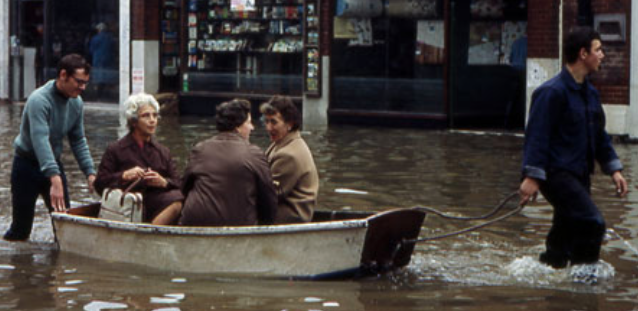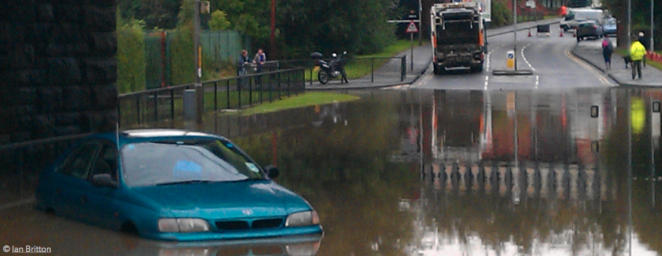Communicating flood risks in a changing climate: nine principles for promoting public engagement

Introduction
How can we engage individuals and communities more effectively around flood risks in a changing climate?
During the winter of 2013/2014, fierce winter weather caused havoc across the UK. Large parts of the Somerset Levels were submerged, Wales was battered by coastal storms, Hull residents were evacuated from their homes and Cornwall was cut off by rail, as the line at Dawlish collapsed into the sea. Although storms are an integral part of the British winter, these floods left their mark on the national consciousness. In a changing climate, floods are likely to happen more often, and be more intense.
This guide answers the question above and is a practical resource for campaigners, policy makers and those working with communities directly affected by flooding. It showcases the latest and most relevant academic research, and draws on valuable learning from a range of practical projects and initiatives. It reflects the key points of consensus from a workshop convened by Climate Outreach, and represents a powerful statement from a diverse cross-section of experts.
Its purpose is to help build community resilience for future climate impacts as well as develop more productive conversations about climate change within the context of flooding.
It identifies nine principles for communicating about flooding in a changing climate.
The text below provides an overview of the nine principles. See the full text for much more detail.
The nine principles of best-practice public engagement
Some of the principles focus on engaging and supporting communities directly affected by flooding. Others refer to ways of communicating with a wider public (including those communities that have not yet been flooded but are at risk). Taken together, they offer a resource which distills the most relevant academic research into a format that practitioners can use to more effectively communicate flood risks in a changing climate. The nine principles and the “bottom line” for each are provided below. For more detail and references to useful material see the full report, available form the right-hand column or via the link provided under further resources.
1. Reduced Uncertainty
Attribution science can provide powerful evidence of the link between flooding and climate change. But establishing this link is the beginning, not the end, of public engagement around extreme weather and climate impacts.
2. A Window of Opportunity
There is increasing evidence of a link between flooding and climate change in the mind of the UK public. Flooding provides a window of opportunity for engaging on wider climate change issues among the general population.

3. Pro-Active Approach
Don’t wait for disaster to strike to talk about climate change: overcoming the silence around climate change in day-to-day life is crucial in laying the foundations for engaging around extreme weather. The best communications are pro-active and are tailored to the audience through developing a dialogue with them.
4. The Right Delivery
Engaging communities during or immediately after a flood is rife with ethical pitfalls. Getting it right means recognising what the affected community’s needs are at any particular time, and responding to them sensitively.
5. Trusted Peer Communicators
Most members of the public don’t empathise with graphs and stats – move people with people using trusted ‘peer’ messengers and personal stories.
Here are some examples of using personal stories:
- The ESRC Sustainable Flood Memories Project
- A collaboration between Exeter University, Climate Outreach & Devon County Council
- Flood Manifesto
6. Local Dynamics
Consider the wider social context for planning and communicating about flooding and climate change in the community you are working with. Floods do not happen in a vacuum, and without a sound understanding of local dynamics, vulnerable members of the affected community may disproportionately suffer as a result.
7. Different Experiences
People’s experience can be authoritative and act as a good indicator as to how other communities might respond but while communities that have been affected multiple times offer powerful opportunities for learning (but also have a right to forget).
8. A Personal Connection
Flood events are local and tangible events that impact directly on people’s lives, and are likely to reduce the ‘psychological distance’ of climate change if a link between flooding and climate change is present in the public mind. To avoid locally- framed messages about climate change backfiring, draw parallels to other similar communities and remember to highlight the things people love that are affected by climate change that may not be geographically local.
About the report
Following the devastating floods experienced by the UK, and in view of the increased threat of flooding under climate change, a growing number of research studies and practical initiatives have focused on how members of the public engage with flooding in the context of climate change.
In response to this burgeoning field of expertise and knowledge, and as part of a project led by the Understanding Risk group at Cardiff University, Climate Outreach convened a one day workshop in Oxford in June 2015. The workshop brought together researchers and practitioners from academia, civil society and the policy arena, with expertise from across the natural and social sciences.
This synthesis report is the outcome of the Oxford workshop, showcasing the latest and most relevant academic research, and drawing on valuable learning from a range of practical projects and initiatives.
The Project Team
Lead authors: Lydia Messling – Research Assistant, Climate Outreach; Dr Adam Corner – Research Director, Climate Outreach; Honorary Research Fellow in the School of Psychology, Cardiff University; Jamie Clarke – Executive Director, Climate Outreach
Contributing authors: Prof Nick Pidgeon – Director of Understanding Risk group, School of Psychology, Cardiff University; Dr Christina Demski – Lecturer, School of Psychology, Cardiff University; Dr Stuart Capstick – Research Associate, School of Psychology, Cardiff University
Funding
This report is a collaboration between Climate Outreach and Cardiff University, supported by the ESRC, the Climate Change Consortium of Wales and the Sustainable Places Research Institute.
Related resources
- Climate Outreach_New Report & Webinar: Communicating flood risks in a changing climate
- Advice on flood planning and preparation (UK specific)
- Do you know what to do during a weather emergency? - Advice on emergency preparedness from the National Safety Council (USA)
- Essential guide to flood planning and preparation
- An essential guide to flood safety and resilience: Advice for UK homeowners





(0) Comments
There is no content